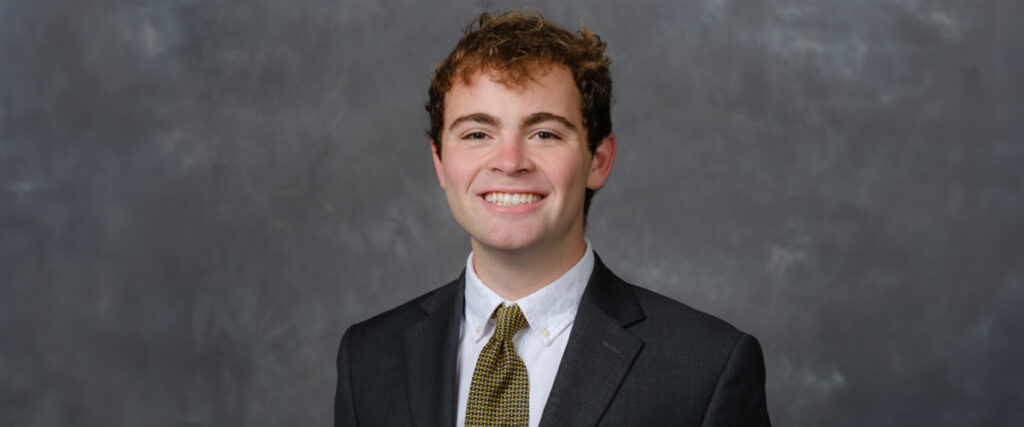Jackson Buttler

Compare your career plans as a first-year student with your career plans now. Why did your plans change or not change?
If I could go back and tell my first-year self anything, it would be to embrace the moments of uncertainty as opportunities for growth. Understand that the pursuit of perfection often hinders progress, while embracing your true self leads to fulfillment.
Don’t shy away from taking risks, even if they seem small or unconventional. Each step you take beyond your comfort zone is a step towards self-discovery, resilience, and a more vibrant college experience. Remember that the beauty of this journey lies in the unexpected connections you make, the passions you uncover, and the growth you achieve.
What was the most rewarding experience you had as a Wake Forest student?
My most rewarding experience as a Wake Forest student was my time working on Wake Forest’s inaugural Campus Climate Survey on Interpersonal Violence.
In spring semester of 2022, the SAPSA Committee began working with an outside vendor, NORC, to create a Campus Climate Survey to contextualize students’ experiences, thoughts, and perspectives to be heard by administrators while maintaining the safety of students by the anonymous responses. The responses have been used to affect real change on campus, through education based interventions, new policies, programming, and more.
Wake Forest has lots of traditions, and sometimes students create their own. Do you have a favorite Wake Forest tradition?
There are a lot of things that make Wake Forest a unique institution, one of those being our university’s rich traditions. I have greatly enjoyed participating in many of these traditions, including Hit the Bricks, rolling the Quad, and the President’s Ball. In these traditions, I’ve found more than just events to attend; I’ve discovered opportunities to bond with my peers, connect with the history of our institution, and foster a sense of belonging within the Wake Forest community. As I reflect on my time here, it’s these traditions that have added depth and character to my college experience, creating lasting memories and a shared legacy that ties us all together as Wake Forest students.
What was your favorite class outside your major or minor areas of study and why did it appeal to you?
While I have greatly enjoyed all of my courses at Wake Forest, both inside and outside of my major, I would say that one class outside of my major that really stuck out to me was my EDU 220 course, which gave me a more practical education about navigating both the professional and non-professional world postgrad. Professor Heidi Robinson taught us how to better navigate networking, finding a job post graduation, and resume writing, while also balancing that with things like finding an apartment, doing taxes, or making a budget. I can confidently say that the skills I learned in this course have been, and will continue to be, profoundly impactful and I have no doubt that it will help me succeed postgrad.
What non-academic experience at Wake Forest was most meaningful to you?
My time as a part of Wake Forest Student Government has been, by far, the most impactful aspect of my tenure as a Wake Forest student, both for my own personal and professional development as well as allowing me to actively contribute to the campus community and witness the tangible effects of student-driven initiatives.
Being a part of Wake Forest Student Government has provided me with a unique platform to advocate for the concerns and aspirations of my fellow students. Whether it was working on initiatives to enhance campus sustainability, collaborating on projects to improve mental health resources, or advocating for inclusive policies, the experience has been incredibly rewarding.
The ability to engage with a diverse range of student voices, collaborate with faculty and administrators, and actively participate in decision-making processes has given me a deeper understanding of the complexities of university governance. Through this experience, I’ve not only honed my leadership and negotiation skills, but also developed a profound appreciation for the power of collective action.
Moreover, witnessing the impact of our advocacy and projects on the daily lives of students has been immensely gratifying. It’s in these moments of positive change, both big and small, that I’ve felt a true sense of fulfillment and purpose in my role.
What is the most fundamental change you’ve experienced since your time as a first-year student?
I think Wake Forest has changed a lot since I first arrived on campus in 2020. Obviously, we’ve seen a change in university leadership, which I think has allowed for a lot of positive change on campus – including a renewed focus on diversity initiatives to ensure that Wake Forest is accessible to students from all walks of life.
The shift in leadership has brought about a more transparent and collaborative approach to decision-making, fostering a sense of community engagement and shared responsibility among students, faculty, and administration, something I have been lucky enough to experience firsthand during my time as Student Body President.
As a result of these positive changes, I believe Wake Forest is evolving into a more dynamic, inclusive, and forward-thinking institution.
